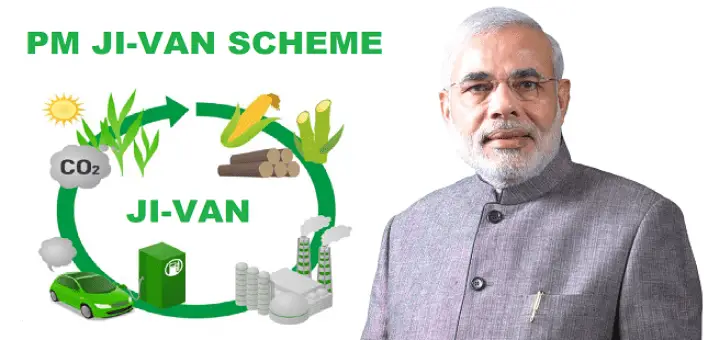Pradhan Mantri JI-VAN (Jaiv Indhan- Vatavaran Anukool fasal Awashesh Nivaran) Yojana 2023 approved by central government, PM JI-VAN Scheme aims to achieve 10% blending percentage of Ethanol in Petrol under EBP programme
The Cabinet Committee on Economic Affairs (CCEA) has approved the Prime Minister’s JI-VAN (Jaiv Indhan- Vatavaran Anukool fasal Awashesh Nivaran) scheme 2019-20. The PM JI-VAN scheme is going to provide financial support to integrated bio-ethanol projects using lignocellulosic biomass and other renewable feedstock. The financial implication of the JI-VAN scheme is that the central government. Will support the scheme with a total financial outlay of Rs. 1959.50 crores for the period 2018-19 to 2023-24.
Out of this amount, Rs. 1800 crores is being allocated to support 12 commercial projects. Additionally, Rs. 150 crores will be provided to support demonstration projects and the remaining Rs. 9.50 crore will be given to the Center for High Technology (CHT) as an administrative fee.
The Ministry of Petroleum and Natural Gas has targeted to achieve 10% blending of ethanol in petrol by FY 2023.
Pradhan Mantri JI-VAN Scheme 2024 – Phase and Benefits
Under this Pradhan Mantri JI-VAN scheme, a feasibility gap funding (VGF) support will be provided in 2 phases to the second generation (2G) ethanol projects at around 12 commercial scale and 10 performance scale: –
Prime Minister’s One-Plan phase
- Phase-I (2018-19 to 2023-23) – Here 6 commercial projects and 5 demonstration projects will be supported.
- Phase-II (2020-21 to 2023-24) – Remaining 6 commercial projects and 5 demonstration projects will be supported here.
The Prime Minister’s JI-VAN plan will focus on encouraging the 2G ethanol sector and support the industry by creating appropriate ecosystems to set up commercial projects and to increase R&D in that area.
Prime Minister’s JI-VAN Benefit
Apart from complementing the targets set by the government under the EBP program, the PM JI-VAN scheme will have the following benefits: –
- To fulfill the vision of the Central Government. To reduce import dependence by replacing fossil fuels with biofuels.
- Achieve GHG emission reduction targets by progressive blending / substitution of fossil fuels.
- To address environmental concerns that occur due to biomass burning, crop residues and improving the health of citizens.
- To increase the income of the farmer by ensuring sufficient income for his waste agricultural residues.
- Creating rural and urban employment opportunities in 2G ethanol projects along the biomass supply chain.
- Contribute to the Swachh Bharat Mission by supporting the aggregation of non-food biofuel feedstocks such as biomass and urban waste.
- Indigenization of second generation biomass for ethanol technologies.
Ethanol produced by the beneficiaries of the Prime Minister GI-VAN scheme will be supplied to oil marketing companies (OMCs) to increase the blending percentage under the EBP program.
Need to start Prime Minister’s JI-VAN Scheme
Central Government. The goal is to achieve a 10% blending percentage of ethanol by 2023. Various efforts have been made such as high ethanol prices, simplification of ethanol procurement system. But still during 2017-18, ethanol has been procured for about 150 crore liters of ethanol. This is sufficient for a combination of about 4.22% based on Pan India. Alternatively, MoP and NG have begun the discovery of 2G ethanol generation from biomass and other wastes to bridge the supply gap under the EBP program. Therefore, to create 2G ethanol capacity in the country and attract investment for this new sector, the Pradhan Mantri G-One scheme has been launched.
The Center for High Technology, a technical body under MoP & NG, will be the primary implementing agency for the PM JI-VAN scheme 2019. All project developers wishing to derive the plan benefits must submit their proposal for review by the Scientific Advisory Committee. All projects recommended by the SAC have to be approved by the Steering Committee.
Ethanol Blended Petrol (EBP) Program Background
Union Government. India has started the EBP program in FY 2003 for blending ethanol in petrol to address environmental concerns. These concerns include burning fossil fuels, sustaining farmers, boosting crude oil imports and saving foreign exchange.
Currently, EBP operates in 21 states and 4 union territories of the country. Under the EBP program, OMCs have to add 10% ethanol to petrol. The current policy permits the purchase of ethanol, which is produced from the petrochemical route including cellulose and lignocellulose materials such as molasses and non-feed stocks.

